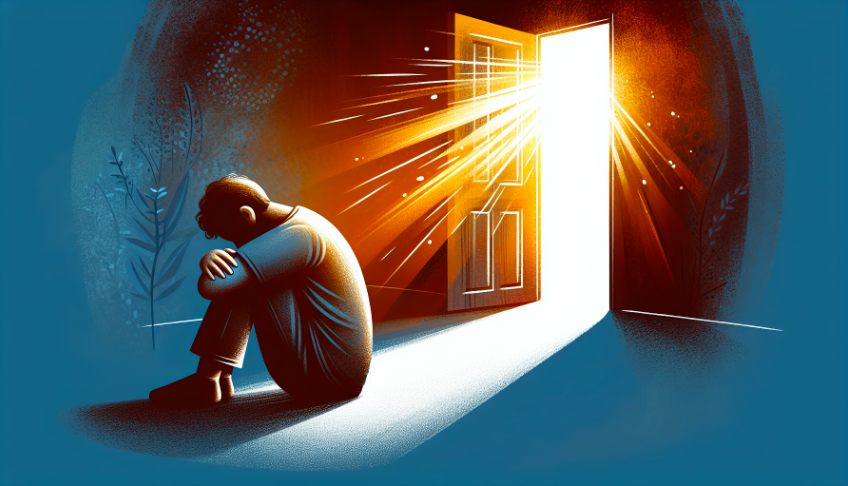Have you ever felt the fear of abandonment or rejection? This fear is incredibly powerful and can have a significant impact on our relationships and personal growth. It holds us back from expressing ourselves authentically and achieving our dreams. In this blog, we will explore why we fear abandonment, the tactics we use to cope with this fear, and most importantly, how to overcome and heal this fear.
Table of Contents
- Why do we fear abandonment?
- Your deficiency story
- The 2 tactics people use to deal with this fear
- How to overcome and heal this fear
- Conclusion
This blog is generated by AI based on our video about this topic. You can watch our video below. Prefer to read on? Just scroll down below the video.
Why do we fear abandonment?
The fear of abandonment is deeply rooted in our past experiences. It is often tied to the pain and intense emotions we felt when we were emotionally, physically or relationally abandoned or rejected by our caretakers, usually our mother or father. These early experiences create a wound that stays with us and affects our relationships and self-perception.
Our demanding, oppressive, fear-based and mind-controlling society is a recipe for every human being to live in survival mode. In a state of perpetual fight, flight or freeze. Living in such a state prevents many parents from providing true healthy emotional support for their children.
As a result, the wounds of abandonment and rejection are passed down from generation to generation. It’s the reason why we all carry this wound within us, impacting our ability to form fulfilling relationships and pursue our dreams.
Download Our Free Starter Pack
& Start Your Journey of Self-discovery, Healing, Transformation & Empowerment!
Your deficiency story
When we experience abandonment or rejection we often create stories of unworthiness and deficiency, believing that we are not worthy of love, acceptance, or success. These deficiency stories further contribute to our fear of abandonment and hinder our personal growth.
These stories lay dormant, until something in the present moment triggers them and activates the connected suppressed pain from our childhood. Consequently, we experience emotional flashbacks. This means that we are pulled back to that initial moment of abandonment, forcing us to confront the heavy feelings we have long suppressed. These suppressed emotions include grief, anxiety, and anger.
The 2 tactics people use to deal with this fear
There are two common tactics people employ to cope with the fear of abandonment: codependency and avoidance. Codependency is rooted in the belief that we cannot survive or be loved without relying heavily on others. We become people-pleasers, lacking boundaries, and conforming to others’ expectations.
On the other hand, avoidance is the belief that it is not safe to attach or connect with others, as they will eventually leave us. Avoidant individuals fear vulnerability and distance themselves from others emotionally. Both tactics have their roots in the initial pain of abandonment and serve as protection mechanisms.
Somatic Exercise: Healing Fear Of Abandonment
This somatic exercise helps you to take a deep dive inside your body and subconscious mind to discover where your fear of abandonment is coming from and which unprocessed pain from the past is behind it. It helps you to start with processing this pain from your past, feel it, express it, heal it and integrate it.
Shop now for €14,99!
How to heal the fear of abandonment
If you are ready to transform your life and overcome the fear of abandonment, there are some necessary steps to take. First, it is important that you become aware of the tactic(s) you are using to avoid being abandoned or rejected. Discovering your protection mechanims will create awareness around your behavior and the wounds that are living inside of you.
This awareness can help you to dive into the suppressed emotions from the past such as your anger or grief. Allowing yourself to feel and process these emotions will help you to start to expand your emotional tolerance level. That means: to what extent you can sit with your emotions and wounds, instead of suppressing them.
Slowly over time this will help you to integrate your past wounds, and release the hold the fear of abandonment has on your life.
Conclusion
Remember, healing is a process, and it takes time. Be patient with yourself and celebrate each step forward. With dedication and self-compassion, you can overcome the fear of abandonment and create a life filled with fulfilling relationships and personal growth.
HEART JOURNEY
The Ultimate Platform for Self-discovery, Healing,
Transformation & Empowerment
Become a member & gain access to all our exclusive tools for €49,95 per year only!
Need Help?
Away from traditional (talk) therapy and coaching we have created new tools for self-discovery, healing, transformation and growth. Our tools follow a holistic approach where we combine somatic and emotional healing practices with psychological theory & guidance.
If you resonated with the insights shared in this blog post and are seeking guidance on your healing journey, here are 3 ways we can help you:
1. Shop In Our Webshop
In our webshop you can find all our tools sorted by theme, visit our shop here.
2. Become A Member
Become a member of our online platform & community for Self-discovery, Healing, Transformation & Empowerment: Heart Journey.
Gain instant access to all our Meditations, Somatic Exercises, Parts Work Exercises, Videos, Visualizations and much more for just €7,95 per month or €49,95 per year!
Start your 5 day free trial here.
3. 1-on-1 Guidance
Feel in need of personal guidance? We offer 1-on-1 guidance that transcends classic talk therapy & coaching, speaks directly to the emotions and trauma stored and suppressed in the body, and gets to the root of mental, emotional & physical suffering. Just click here to book a free intake.
Related Blogs

Perfectionism: How to Heal & Overcome it
Perfectionism is often viewed as a character trait, something to be proud of. However, the truth is that perfectionism is not a desirable quality, but rather a coping mechanism developed to deal with deeper emotional wounds and insecurities. It is a way of sabotaging...

Procrastination: Why you do it & How to overcome it
Procrastination is a fascinating phenomenon. We often have dreams and desires, but when it is time to take action, we find ourselves getting distracted, or feeling resistance in the form of experiencing negative emotions such as anger, sadness, and anxiety. We become...

Fear Of Failure: Overcoming Your Biggest Obstacle
Fear of failure is a common fear that many people struggle with. It can hold us back from pursuing our dreams, creating the life we desire, and even transforming ourselves. In this blog, we will explore what fear of failure is, why we are afraid to fail, and how to...

How To Overcome Fear
If there is one emotion that is often holding people back from healing from their past, expressing their authentic self, or transforming themselves and their lives, it is fear. The fear of being rejected, abandoned, or fail for example. But fear can manifest itself in...



